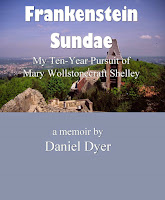Back in England, it’s not long before Lodore gets into an argument with an
American, a Mr. Hatfield, who's saying unpleasant things about Englishmen. A duel ensues. The men fire pistols at each other, and
Lodore takes a bullet in the heart and dies instantly. Ethel grieves horribly for the loss of her
beloved father. She goes to live with Elizabeth,
her aunt. There, she meets and begin to
socialize with a young man named Villiers—the young man who had served as
Lodore’s second in his fatal duel.
One night at the opera, Ethel and Villiers accidentally run
into Lady Lodore, Ethel’s mother, who does not recognize them. Next day, Villiers calls on her, and then we
learn about Villiers’ history—and about what Lady Lodore has been doing all
these years that Lodore and Ethel were in America.
The relationship between Ethel and Villiers fluctuates, but
eventually they marry and travel to Naples, Italy; when they arrive, Mt.
Vesuvius greets them with a blood-red
flash.[i]
They travel to Rome before heading back to England, where they begin to experience financial difficulties: Villiers’ father has been spending all the money the family has. Villiers cannot pay even the lowest of his debts, and he and Ethel must hide from the bill-collectors (just as Shelley and Mary had once had to do).
Lady Lodore learns of Ethel’s financial problems and wants to help. he decides to visit her daughter, with whom she has not spoken for many years. Edith is thrilled to see her—but she will not leave her struggling husband to live with Lady Lodore. But Lady Lodore has made a decision: She
was resolved to sacrifice every thing to her daughter—to liberate Villiers, and
to establish her in ease and comfort.[i] She decides to surrender all her fortune to Villiers (anonymously) and then move to Wales and live in poverty. She makes the arrangements, and Villiers and Ethel move into the fine Lodore house while Lady Lodore disappears into the Welsh countryside.
But Elizabeth (Lord Lodore’s sister) finds Lady Lodore, who is sick. Ethel, who has learned that her mother has surrendered everything to her, finds her, and they reconcile. ary ends the novel by observing that human beings need two things in life: a
love of truth in ourselves, and a sincere sympathy with our fellow-creatures.[i]
[i] Ed.
Lisa Vargo, (Orchard Park, NY: Broadview Literary Texts, 1997), 257.
[i] Ibid., 367.
[i] Ibid., 448.


No comments:
Post a Comment